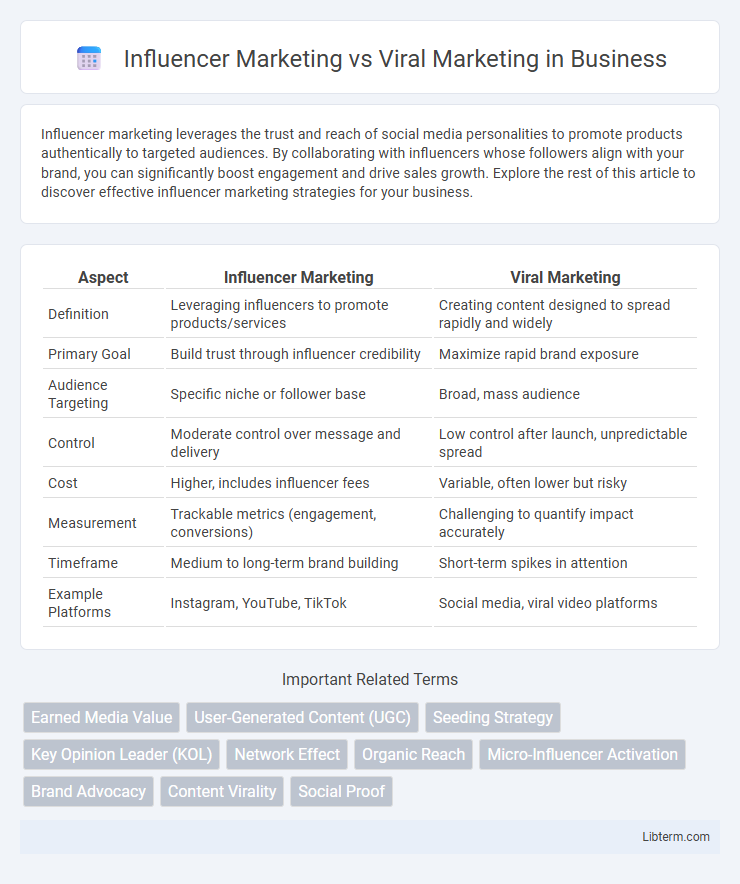Influencer marketing leverages the trust and reach of social media personalities to promote products authentically to targeted audiences. By collaborating with influencers whose followers align with your brand, you can significantly boost engagement and drive sales growth. Explore the rest of this article to discover effective influencer marketing strategies for your business.
Table of Comparison
| Aspect | Influencer Marketing | Viral Marketing |
|---|---|---|
| Definition | Leveraging influencers to promote products/services | Creating content designed to spread rapidly and widely |
| Primary Goal | Build trust through influencer credibility | Maximize rapid brand exposure |
| Audience Targeting | Specific niche or follower base | Broad, mass audience |
| Control | Moderate control over message and delivery | Low control after launch, unpredictable spread |
| Cost | Higher, includes influencer fees | Variable, often lower but risky |
| Measurement | Trackable metrics (engagement, conversions) | Challenging to quantify impact accurately |
| Timeframe | Medium to long-term brand building | Short-term spikes in attention |
| Example Platforms | Instagram, YouTube, TikTok | Social media, viral video platforms |
Understanding Influencer Marketing
Influencer marketing leverages individuals with established credibility and audience trust on platforms like Instagram, YouTube, and TikTok to promote brands, driving targeted engagement and conversions. Key metrics such as follower demographics, engagement rates, and content relevance are critical for selecting effective influencers and maximizing campaign ROI. Unlike viral marketing, which aims for rapid and widespread content sharing often driven by creativity or controversy, influencer marketing relies on strategic collaboration and long-term relationship building to influence purchasing decisions.
Defining Viral Marketing
Viral marketing is a strategy that encourages individuals to share a marketing message rapidly through social networks, creating exponential growth in the message's visibility and reach. It relies on compelling, shareable content designed to evoke strong emotional responses or curiosity, which motivates users to spread it organically. Unlike influencer marketing that leverages specific personalities to promote products, viral marketing depends on the content itself to drive widespread dissemination without targeting predefined influencers.
Key Differences Between Influencer and Viral Marketing
Influencer marketing leverages credible individuals with dedicated followings to promote products or services, focusing on trust and targeted engagement. Viral marketing aims to create highly shareable content that spreads rapidly across social networks, relying on organic amplification rather than specific personalities. The key difference lies in influencer marketing's relationship-driven approach versus viral marketing's emphasis on content virality and mass reach.
Target Audiences and Reach
Influencer marketing targets specific audience segments by leveraging the established trust and engagement of influencers within niche communities, ensuring a highly focused reach. Viral marketing aims for rapid, widespread exposure by encouraging sharing across broad demographics, maximizing overall reach but with less precision in audience targeting. Both strategies serve different objectives: influencer marketing drives deeper connection and conversion within targeted groups, while viral marketing prioritizes mass awareness and brand visibility.
Strategies Involved in Influencer Marketing
Influencer marketing strategies center around identifying niche influencers with engaged audiences, crafting authentic collaborations, and leveraging long-term partnerships to build brand trust and loyalty. Content creation is tailored to the influencer's style to enhance relatability and maximize organic reach across platforms such as Instagram, TikTok, and YouTube. Campaign performance is tracked using metrics like engagement rate, conversion rate, and audience demographics to optimize future marketing efforts and ensure ROI.
Strategies Involved in Viral Marketing
Viral marketing strategies leverage shareable and emotionally engaging content designed to trigger rapid user sharing across social media platforms, often employing humor, surprise, or strong visual appeal to maximize organic reach. Creating challenges, interactive campaigns, or collaborations with digital communities further amplifies message dissemination by encouraging user participation and content generation. Unlike influencer marketing's reliance on endorsements from individuals with established followings, viral marketing emphasizes crafting content with high potential for exponential spread through peer-to-peer sharing and network effects.
Measuring Success: Metrics and ROI
Influencer marketing success is measured by tracking engagement rates, follower growth, conversion rates, and return on investment (ROI) through affiliate links or discount codes. Viral marketing metrics focus on shareability, reach, impressions, and the speed of content spread across social media platforms, emphasizing exponential growth patterns. ROI analysis in both strategies involves assessing sales uplift, brand awareness, and customer acquisition costs to determine overall marketing effectiveness.
Pros and Cons of Influencer Marketing
Influencer marketing leverages individuals with established audiences to promote products, ensuring targeted reach and enhanced credibility, but it can be costly and may face challenges with influencer authenticity. Compared to viral marketing, which aims for rapid, widespread exposure often unpredictably, influencer marketing provides more controlled and measurable results. However, influencer campaigns may have limited scalability and risk diminishing engagement if overused or misaligned with the brand.
Pros and Cons of Viral Marketing
Viral marketing leverages rapid, organic content sharing to achieve widespread brand exposure at a relatively low cost, making it highly scalable and effective for quick awareness. However, its unpredictable nature poses significant risks, as campaigns can backfire or fail to gain traction, leading to wasted resources and potential brand damage. Unlike influencer marketing, viral marketing lacks targeted audience control, making consistency and measurable ROI more challenging to attain.
Choosing the Right Approach for Your Brand
Choosing the right approach between influencer marketing and viral marketing depends on your brand's goals, target audience, and budget. Influencer marketing leverages trusted personalities to build long-term engagement and credibility, while viral marketing aims for rapid, widespread exposure through shareable content. Brands seeking sustained customer relationships often benefit more from influencer marketing, whereas those prioritizing fast visibility and brand awareness may find viral campaigns more effective.
Influencer Marketing Infographic

 libterm.com
libterm.com